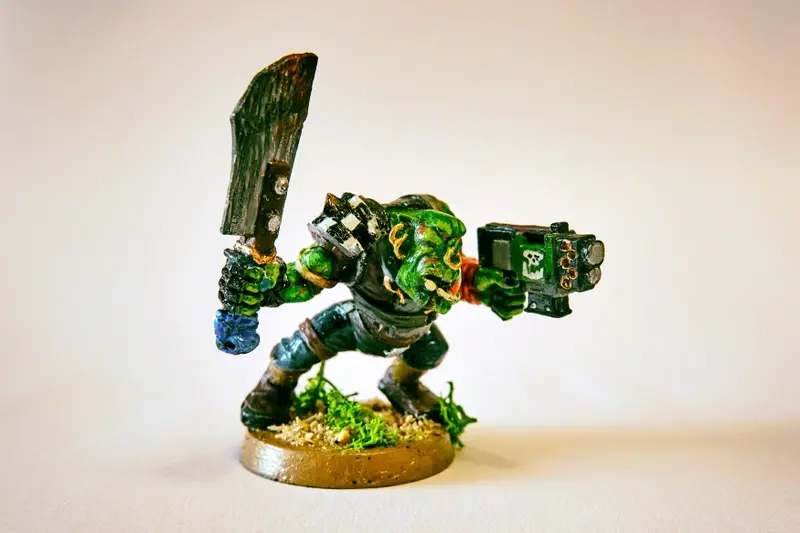
- Deal inked following long hiatus
- Companies yet to ‘agree creative guidelines’
- FY24 guidance left unchanged
Fantasy miniatures-maker Games Workshop’s (GAW) deal with Amazon (AMZN:NASDAQ) to develop the Warhammer 40,000 universe into films and TV series has been signed at long last.
It has been almost a year to the day since the company announced an ‘agreement in principle’ with the US tech, retail and entertainment titan.
This delay has caused some investors to question progress, so the welcome news nudged shares in Nottingham-based Games Workshop 1.5% higher to £99.30 in early dealings.
Shares in the FTSE 250 firm have regained lost ground in recent sessions after a sharp drop on 7 December caused by an implied second quarter growth slowdown.
EXTENDED TIMELINE
Under the terms of the exciting tie-up, Games Workshop has granted Amazon exclusive rights in relation to films and television series set within the Warhammer 40,000 universe, together with an option for the US mega cap to license equivalent rights in the Warhammer Fantasy universe following the release of the initial Warhammer 40,000 production.
However, investors shouldn’t expect content to appear on-screen any time soon, as there will now be a 12-month period during which the two companies will ‘agree creative guidelines’ for the films and television series Amazon will develop.
The agreement will only proceed once these have been ‘mutually agreed’ and FTSE 250 constituent Games Workshop has made no changes to its financial guidance for the 53 weeks ending 2 June 2024.
Jefferies said it expects an ‘extended timeline until we see a Warhammer 40,000 production actually hit the screens. After the 12-month period to agree creative guidelines, the process will include hiring a writer, preparing scripts, finding locations, building sets, filming, production and postproduction’, explained the broker.
Jefferies also warned it could be three years before a first TV series is aired on Amazon and noted that there can be around a two-year gap between seasons ‘unless the schedule is fully committed and well planned in advance’.
AMAZON-SIZED OPPORTUNITY
But the exciting news for Games Workshop’s shareholders is that based on an episode budget of $20 million to $30 million, Jefferies believes the rights-holder ‘could earn $1 million per episode, or $10 million assuming a 10-part series. Moreover, we should anticipate both fees and bonuses being higher in follow-on seasons.’
And the broker sounded particularly upbeat on the potential for core Warhammer brand sales to be enhanced by the exposure of a TV series, believing that ‘the downstream effect on miniatures revenues could be significant. For context, we believe key titles can reach circa 20% audience penetration on major streaming platforms - given Amazon has previously reported circa 200 million Prime members streaming shows/movies, the potential for Warhammer to build its global exposure is clearly a huge opportunity.’
THE EXPERT’S VIEW
AJ Bell investment director Russ Mould commented: ‘Games Workshop knows it is sitting on a gold mine with its fantasy world IP. It has made a mint from selling miniature figures that hobbyists like to paint and deploy in tabletop battles, and there is an opportunity to make even more money through creating dramas around its vast array of characters and universes and selling associated merchandise.’
But Mould warned there is ‘a fine line to tread between sweating the assets and royally mucking up. Games Workshop risks long-lasting reputational damage if Amazon makes a mockery of its IP on the screen. After all, a stinker of a show stays in people’s minds for a long time. For every Lord of the Rings blockbuster franchise there are catastrophic flops like the Dolph Lundgren-fronted Masters of the Universe film.’
Mould added: ‘Games Workshop is very protective of its assets as we’ve seen in recent years where it has shown zero tolerance towards fan-made animation videos on YouTube. That suggests Amazon will not be given complete creative licence to do whatever it wants.’
DISCLAIMER: Financial services company AJ Bell referenced in this article owns Shares magazine. The author of this article (James Crux) and the editor (Ian Conway) own shares in AJ Bell.
LEARN ABOUT GAMES WORKSHOP




